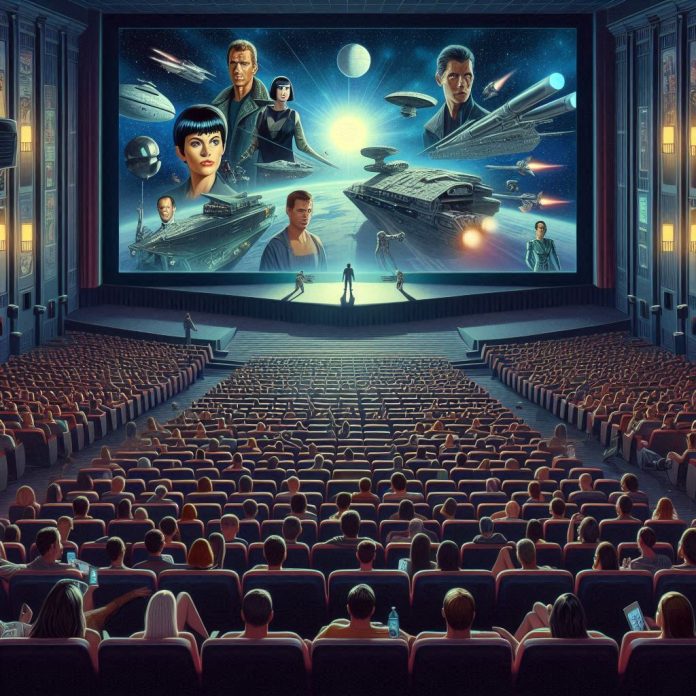Science fiction is a genre that has captivated audiences for decades, transporting viewers to futuristic worlds, exploring the depths of space, and pondering the vast possibilities of technology and human evolution. The allure of sci-fi lies in its ability to stretch the imagination, challenge our understanding of reality, and ask profound questions about our existence.
From the awe-inspiring visuals of distant galaxies to the intimate, thought-provoking narratives of human experience, sci-fi films have a unique way of blending the fantastical with the philosophical.
This article embarks on a journey through time to highlight some of the best sci-fi movies ever made. We will delve into the classics that laid the groundwork for the genre, examine modern masterpieces that pushed the boundaries of storytelling and visual effects. We will unearth underrated gems that deserve more recognition. Whether you’re a seasoned sci-fi aficionado or a newcomer to the genre, this curated list will offer insights and recommendations that celebrate the diversity and depth of science fiction cinema.
So, grab your popcorn, dim the lights, and prepare to explore the best sci-fi movies of all time.
Classic Sci-Fi Films
Science fiction as a film genre has a long and storied history, with certain films standing out as timeless classics that have not only entertained audiences but also influenced the genre in profound ways. These films have left an indelible mark on the landscape of cinema and continue to inspire filmmakers and audiences alike. In this section, we will explore three quintessential sci-fi movies that have achieved legendary status: 2001: A Space Odyssey, Blade Runner, and Star Wars: A New Hope.
2001: A Space Odyssey
Stanley Kubrick’s 2001: A Space Odyssey, released in 1968, is often hailed as one of the most groundbreaking films in cinematic history. Collaborating with renowned science fiction author Arthur C. Clarke, Kubrick created a visually stunning and intellectually stimulating masterpiece that delves into themes of human evolution, artificial intelligence, and extraterrestrial life. The film’s meticulous attention to detail, innovative special effects, and enigmatic narrative structure set it apart from anything that had come before.
Its iconic sequences, such as the bone-to-satellite match cut and the hauntingly beautiful voyage through the Stargate, remain etched in the collective memory of cinephiles. 2001: A Space Odyssey is not just a sci-fi film; it is an experience that challenges viewers to ponder the mysteries of existence and our place in the universe.
Blade Runner
Ridley Scott’s Blade Runner, released in 1982, is another seminal work in the sci-fi genre. Based on Philip K. Dick’s novel Do Androids Dream of Electric Sheep?, the film presents a dystopian future where advanced humanoid robots, known as replicants, struggle for freedom and identity. The film’s dark, moody atmosphere, coupled with its thought-provoking exploration of themes such as humanity, memory, and morality, have cemented its status as a classic.
Harrison Ford’s portrayal of the weary, morally ambiguous protagonist, Rick Deckard, adds depth to the narrative, while the film’s visual design, characterized by its neon-lit cityscapes and rain-soaked streets, has influenced countless works of science fiction and cyberpunk. Blade Runner is a film that grows richer with each viewing, offering new insights into the human condition and the ethical implications of technological advancement.
Star Wars: A New Hope
No discussion of classic sci-fi films would be complete without mentioning George Lucas’s Star Wars: A New Hope. Released in 1977, this epic space opera redefined the genre and became a cultural phenomenon that continues to resonate with audiences today. The film’s blend of high-stakes adventure, memorable characters, and groundbreaking special effects created a cinematic experience that was both thrilling and immersive.
From the opening crawl to the climactic Death Star trench run, A New Hope captured the imaginations of viewers and transported them to a galaxy far, far away. The film introduced iconic characters such as Luke Skywalker, Princess Leia, Han Solo, and Darth Vader, whose stories have since become legendary. Moreover, John Williams’s iconic score added an emotional depth that elevated the film to new heights.
Star Wars: A New Hope is not just a movie; it is a cultural touchstone that has influenced generations of filmmakers and continues to inspire new fans around the world.
These classic sci-fi films have each contributed to the genre in unique ways, pushing the boundaries of storytelling, visual effects, and thematic exploration. They have set a high standard for what science fiction can achieve, and their enduring legacy is a testament to their brilliance. As we move forward to discuss modern sci-fi masterpieces, it is important to recognize the foundational role these classics have played in shaping the genre.
Modern Sci-Fi Masterpieces
The new millennium ushered in a fresh wave of science fiction films that not only captivated audiences but also pushed the boundaries of what the genre could achieve. These modern sci-fi masterpieces blend cutting-edge special effects with profound storytelling, exploring complex themes that resonate with contemporary viewers. Here are three films that exemplify the best of modern science fiction.
Inception
Directed by Christopher Nolan, Inception (2010) is a mind-bending thriller that delves into the concept of shared dreaming. The film follows Dom Cobb (Leonardo DiCaprio), a skilled thief who specializes in extracting secrets from within the subconscious during the dream state. Cobb is offered a chance to have his criminal record erased if he can successfully plant an idea in someone’s mind—a process known as inception.
Inception is renowned for its intricate plot structure and stunning visual effects, which earned it four Academy Awards. The film’s exploration of dreams within dreams challenges the audience’s perception of reality, raising questions about the nature of consciousness and the power of the human mind. Nolan’s masterful direction, combined with Hans Zimmer’s haunting score, creates an unforgettable cinematic experience that continues to inspire and perplex viewers.
The Matrix
The Matrix (1999), directed by the Wachowskis, is a groundbreaking film that redefined the science fiction genre. The story follows Thomas Anderson, aka Neo (Keanu Reeves), a computer hacker who discovers that the world he lives in is a simulated reality created by intelligent machines. With the help of Morpheus (Laurence Fishburne) and Trinity (Carrie-Anne Moss), Neo learns to navigate this artificial world and confront the oppressive system controlling humanity.
The Matrix is celebrated for its innovative use of special effects, particularly the “bullet time” technique, which allows for fluid, slow-motion action sequences. The film’s philosophical underpinnings, drawing on concepts from cyberpunk literature, existentialism, and Eastern philosophy, invite viewers to question the nature of reality and the potential consequences of artificial intelligence.
The Matrix has left an indelible mark on popular culture, influencing countless films, video games, and even fashion.
Interstellar
Christopher Nolan makes another appearance on this list with Interstellar (2014), a visually stunning and emotionally charged exploration of space travel and the human spirit. The film stars Matthew McConaughey as Cooper, a former pilot who joins a team of explorers on a mission to find a new habitable planet for humanity. As Earth faces ecological collapse, Cooper and his team navigate the far reaches of space, encountering wormholes, black holes, and time dilation.
Interstellar is praised for its scientific accuracy, thanks to the input of theoretical physicist Kip Thorne, who served as a consultant and executive producer. The film’s depiction of space travel and its emotional core, centered on the bond between Cooper and his daughter Murph (Mackenzie Foy, later Jessica Chastain), resonate deeply with audiences.
Hans Zimmer’s stirring score and the film’s breathtaking visuals further enhance its status as a modern masterpiece. Interstellar challenges viewers to contemplate the future of humanity and the sacrifices necessary for survival.
These modern sci-fi masterpieces showcase the genre’s evolution, combining technological advancements with rich, thought-provoking narratives. They have not only entertained audiences worldwide but also sparked discussions about the nature of reality, the potential of human ingenuity, and the ethical implications of scientific progress.
Underrated Sci-Fi Gems
While blockbuster hits and classic films often dominate the conversation around the best sci-fi movies of all time, there are numerous lesser-known gems that have made significant contributions to the genre. These underrated films offer unique perspectives, innovative storytelling, and profound themes that deserve recognition. Here, we delve into three such masterpieces: Moon, Arrival, and Children of Men.
Moon
Directed by Duncan Jones, Moon (2009) is a hauntingly beautiful exploration of isolation, identity, and corporate ethics. Sam Rockwell delivers a tour-de-force performance as Sam Bell, a solitary astronaut nearing the end of his three-year stint on a lunar base. The narrative intensifies when Sam discovers a doppelgänger, leading to a series of revelations about his true purpose and the nature of his existence.
Moon stands out for its minimalist approach, relying heavily on Rockwell’s acting and the eerie, desolate lunar landscape to build tension. The film’s philosophical underpinnings question the ethical boundaries of technological advancements and corporate exploitation. Clint Mansell’s evocative score further enhances the film’s melancholic atmosphere, making “Moon” a must-watch for any sci-fi enthusiast seeking a thought-provoking experience.
Arrival
Denis Villeneuve’s Arrival (2016) is a cerebral sci-fi masterpiece that explores themes of language, time, and human connection. The film follows linguist Dr. Louise Banks (Amy Adams), who is recruited by the military to communicate with extraterrestrial beings that have landed on Earth. As she deciphers their complex language, she uncovers a deeper understanding of time and existence.
Arrival is lauded for its intellectual depth and emotional resonance. The film’s non-linear narrative structure challenges viewers to reconsider their perception of time and destiny. Amy Adams delivers a powerful performance, capturing the vulnerability and strength of her character. Jóhann Jóhannsson’s haunting score and Bradford Young’s stunning cinematography further elevate the film, creating an immersive and contemplative experience.
Arrival is a testament to the power of sci-fi to probe profound philosophical questions while delivering a compelling narrative.
Children of Men
Alfonso Cuarón’s Children of Men (2006) presents a dystopian future where humanity faces extinction due to global infertility. The film follows Theo Faron (Clive Owen), a disillusioned bureaucrat who becomes an unlikely hero when he is tasked with protecting the first pregnant woman in eighteen years. As they journey through a chaotic and decaying world, themes of hope, sacrifice, and redemption emerge.
Children of Men is renowned for its immersive world-building and technical brilliance. Cuarón’s use of long, continuous shots, particularly in the film’s intense action sequences, creates a sense of immediacy and realism. The film’s bleak yet richly detailed setting serves as a stark backdrop for its exploration of societal collapse and the enduring human spirit.
Clive Owen, alongside a strong supporting cast including Julianne Moore and Michael Caine, delivers a gripping performance that anchors the film’s emotional core.
Despite its critical acclaim, Children of Men did not achieve the commercial success it deserved, but it remains a powerful and relevant piece of sci-fi cinema that resonates with contemporary global issues.
Conclusion
Science fiction has long captivated audiences with its ability to stretch the imagination, challenge perceptions, and explore the profound “what ifs” of our existence. From the groundbreaking visuals and philosophical depth of 2001: A Space Odyssey to the dystopian neon-lit streets of Blade Runner, classic sci-fi films have laid the foundation for the genre, inspiring countless filmmakers and igniting the imaginations of viewers worldwide.
Modern masterpieces like Inception, The Matrix, and Interstellar have continued to push the boundaries, blending cutting-edge technology with intricate storytelling to create unforgettable cinematic experiences. These films not only entertain but also provoke thought, encouraging us to question reality, time, and the very fabric of our universe.
Yet, amid the giants of the genre, there are numerous underrated gems that deserve recognition. Films like Moon, Arrival, and Children of Men offer unique and compelling narratives that may not have received the mainstream acclaim of their blockbuster counterparts but are equally deserving of praise.
Each of these movies brings something distinct to the table, whether it be a poignant exploration of humanity, an innovative narrative structure, or a sobering glimpse into potential futures.
In conclusion, the best sci-fi movies of all time are not merely defined by their box office success or visual effects but by their ability to resonate on a deeper level. They challenge us to think critically, dream bigger, and consider the endless possibilities that lie ahead. Whether you’re a lifelong fan of the genre or a newcomer looking to explore its depths, these films offer a rich tapestry of ideas and adventures that continue to inspire and entertain.
As we look to the future, the legacy of these sci-fi masterpieces will undoubtedly endure, guiding us through the uncharted territories of our imagination.
<iframe width="560" height="315" src="https://www.youtube.com/embed/eHIw-LSDG30?si=BHgdIp4kBYkGMTxX" title="YouTube video player" frameborder="0" allow="accelerometer; autoplay; clipboard-write; encrypted-media; gyroscope; picture-in-picture; web-share" referrerpolicy="strict-origin-when-cross-origin" allowfullscreen></iframe>




.jpg?w=100&resize=100,70&ssl=1)
